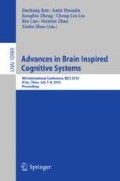Abstract
This paper presents a fuzzy logic control for a distributed multi-node temperature control. The fuzzy logic controller is also introduced to the system for keeping temperature index to be constant. Because real-time induction temperature has many differences with correlation in industry. So the temperature control of induction is more important to control temperature of each node. The result of main fuzzy controller and five node fuzzy controllers of temperature will be conducted in this paper. It is observed that the effect of adjacent node fuzzy controller on performance of distributed multi-node temperature. The node of adjacent fuzzy controller can avoid strong sway phenomenon, and industrial temperature control system introduced in paper can get good regulation quality.
Access this chapter
Tax calculation will be finalised at checkout
Purchases are for personal use only
References
Ziółkowskia, E., Śmierciak, P.: Comparison of energy consumption in the classical (PID) and fuzzy control of foundry resistance furnace. Arch. Foundry Eng. 12(3), 349–350 (2012)
Dambrosio, L.: Data-based fuzzy logic control tenchnique appied to a wind system. Energy Proc. 126, 690–697 (2017)
Shahid, H., et al.: Design of a fuzzy logic based controller for fluid level application. World J. Eng. Technol. 04(3), 469–476 (2016)
Ugaji, N.: Fuzzy logic toolbox for MATLAB. J. Jpn. Soc. Fuzzy Theory Syst. 7(2), 797 (1995)
Ramya, T., Kannan, A.C., Balasenthil, R.S., Bagirathi, B.A.: Fuzzy logic modeling for decision making processes using MATLAB. Adv. Mater. Res. 3269, 984 (2014)
Debnath, M.K., Mallick, R.K., Sahu, B.K.: Application of hybrid differential evolution–grey wolf optimization algorithm for automatic generation control of a multi-source interconnected power system using optimal fuzzy–PID controller. Electr. Power Compon. Syst. 45, 19 (2017)
Cheng, C.-H.: Design of output filter for inverters using fuzzy logic. Expert Syst. Appl. 38(7), 8639–8647 (2011)
Martínez, L.G., Licea, G., Rodríguez, A., Castro, J.R., Castillo, O.: Using MatLab’s fuzzy logic toolbox to create an application for RAMSET in software engineering courses. Comput. Appl. Eng. Educ. 21(4), 1753–1766 (2013)
Yameng, J., Jianguo, H., Jing, W.: An information criterion for source number detection with the peak-to-average power ratio modified by Gerschgorin radii. In: IEEE International Conference on Signal Processing, Communications and Computing (ICSPCC), Xi’an, China, pp. 1048–1052 (2011)
Cao, F., Yang, Z., Ren, J., Ling, W.K., et al.: Sparse representation based augmented multinomial logistic extreme learning machine with weighted composite features for spectral-spatial classification of hyperspectral images. IEEE Trans. Geosci. Remote Sens. 185, 1–10 (2018)
Gomaa Haroun, A.H., Li, Y.: A novel optimized hybrid fuzzy logic intelligent PID controller for an interconnected multi-area power system with physical constraints and boiler dynamics. ISA Trans. 71, 364–379 (2017)
Zhang, A., Sun, G., Ren, J., et al.: A dynamic neighborhood learning-based gravitational search algorithm. IEEE Trans. Cynern. 12, 644–654 (2017)
Wang, C.-L., Ren, J., et al.: Spectral-spatial classification of hyperspectral data using spectral-domain local binary patterns. Multimed. Tools Appl. 13, 2019 (2018)
Wang, Z., Ren, J., Zhang, D., Sun, M., Jiang, J.: A deep-learning based feature hybrid framework for spatiotemporal saliency detection inside videos. Neurocomputing 229, 279–292 (2018)
Ramesh, T., Panda, A.K., Kumar, S.S.: Type-1 and type-2 fuzzy logic and sliding-mode based speed control of direct torque and flux control induction motor drives – a comparative study. Int. J. Emerg. Electr. Power Syst. 14(5), 385 (2013)
Funding
This work was supported by The Doctoral Scientific Research Foundation of Xi’an Polytechnic University (BS1413).
Author information
Authors and Affiliations
Corresponding author
Editor information
Editors and Affiliations
Rights and permissions
Copyright information
© 2018 Springer Nature Switzerland AG
About this paper
Cite this paper
Wei, J., Jiao, Y. (2018). Distributed Multi-node of Fuzzy Control Considering Adjacent Node Effect for Temperature Control. In: Ren, J., et al. Advances in Brain Inspired Cognitive Systems. BICS 2018. Lecture Notes in Computer Science(), vol 10989. Springer, Cham. https://doi.org/10.1007/978-3-030-00563-4_83
Download citation
DOI: https://doi.org/10.1007/978-3-030-00563-4_83
Published:
Publisher Name: Springer, Cham
Print ISBN: 978-3-030-00562-7
Online ISBN: 978-3-030-00563-4
eBook Packages: Computer ScienceComputer Science (R0)

